Tourist industry must keep up with the times
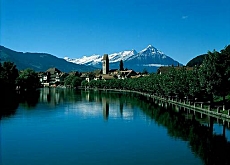
Switzerland is struggling to keep pace with change in the global tourist industry and adapt to the needs of the new, sophisticated traveller warn industry experts.
Travel specialists tell swissinfo that the country’s mountain scenery is hard to beat, but add that location is not enough on its own to attract visitors from abroad.
The latest official tourism figures and forecasts could lull Swiss resorts and the hotel industry into a false sense of security.
The number of overnights stays jumped by four per cent this past winter, and 2006 as a whole should see a healthy rise of 2.6 per cent.
In a broader context, the tourist industry has been in recovery mode since 2003 reflecting a robust global economy, but the numbers are still below the peak years of the 1980s and early 1990s.
A closer analysis also reveals that Swiss cities made the most gains (up 6.5 per cent in winter), being particularly popular as weekend getaway destinations and for business travellers.
Major towns have compensated for the dismal results in Switzerland’s two most important alpine tourist regions; cantons Valais (which includes Zermatt and Verbier) and Graubünden (Davos and St Moritz among others).
Swiss, British and American tourism experts speaking at a recent symposium hosted by the Swiss tourist office, Switzerland Tourism, said cities were benefiting from the trend towards shorter and more frequent holidays, helped in no small way by low airfares.
What price?
But they also warned that Swiss hotels and resorts would be fighting a losing battle if they tried to compete on price with other destinations around the globe.
“I believe Switzerland will have a problem in the future because it is decreasing its room rates and not improving anything,” said Rory Byrne of Powder Byrne, speaking to swissinfo.
The British tour operator specialises in luxury holidays, with the emphasis on Swiss resorts for its ski packages. But Switzerland is absent from its summer offers.
Byrne said one reason was because his clients, like the majority of Europeans, want sunshine and sand in summer. He said however, his company could sell weekend packages to the Swiss Alps in the spring and autumn shoulder seasons, if more resorts could convince their hotels, restaurants and lifts to remain open.
“A village in the mountains should be open to sell all year round – and be able to fill all 52 weekends,” Byrne explained. “That is where the market is [since] people have free time at the weekend.”
“When people got there [Switzerland], they were disappointed with the services, so we haven’t really developed that [package],” added Mark Jones, managing director of lastminute.com, one of Britain’s leading online travel companies.
A to B
Jones said it was difficult to put together Swiss packages that include the services needed to keep holidaymakers happy from point A to B or activities to entertain them from sun up to sun down.
He said he believes Switzerland will remain a top winter destination, but will have trouble developing its summer market, faced with increasingly stiff competition from the Gulf states and Far East.
Europeans, according to Jones, are travelling ever-greater distances for short breaks. “We have customers who go to Thailand for a long weekend…[and] we cannot satisfy demand for destinations like Dubai.”
Flexibility wanted
“[Countries in] the Far East will build the solution that people want,” Jones said. “They’ll provide the flexibility.”
For Phillip Gordon of the United States-based Globus group of tour operators, the Swiss have made progress improving services but still fall short of the mark, failing, for instance, to provide air conditioning in many hotel rooms, which Americans expect as a standard feature.
“The Chinese are extremely competent at putting together infrastructure as needed so they recognise what the American customer wants, such as air conditioning,” Gordon said. “They build it and you will come.”
He said Switzerland should create more tours with religious themes – popular with Americans – with potential to highlight the importance of Zurich and Geneva during the Reformation and post-Reformation periods, and its Catholic heritage.
David Bosshart, head of the Gottlieb Duttweiler Institute, a Swiss think tank, told the meeting that Switzerland should reposition itself as a “Noah’s Ark”.
He said it could be better marketed as a destination that had developed organically over time, and not artificially created such as Dubai or Las Vegas.
The challenge, according to Bosshart, was for the Swiss to do a better job selling themselves.
This included promoting the country’s authentic culture and cuisine, natural landscape and excellent train and bus network and, in light of the numerous terrorist attacks on tourist resorts in the Middle East and Asia, as a safe place to visit.
swissinfo, Dale Bechtel
Hotel occupancy rates increased by 4% during winter 2005/06 compared to 2004/05.
BAK Basel Economics has forecast an increase of 2.6% for all of 2006.
Growth is expected to be modest in 2007 (0.4%) but will rise to 2.5% in 2008, boosted by the European Football Championships which Switzerland will co-host that year with Austria.

In compliance with the JTI standards
More: SWI swissinfo.ch certified by the Journalism Trust Initiative

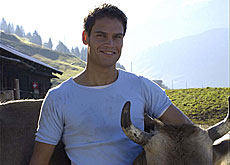
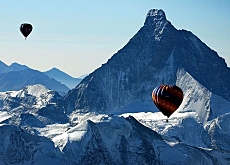
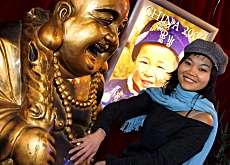
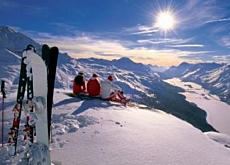
You can find an overview of ongoing debates with our journalists here . Please join us!
If you want to start a conversation about a topic raised in this article or want to report factual errors, email us at english@swissinfo.ch.